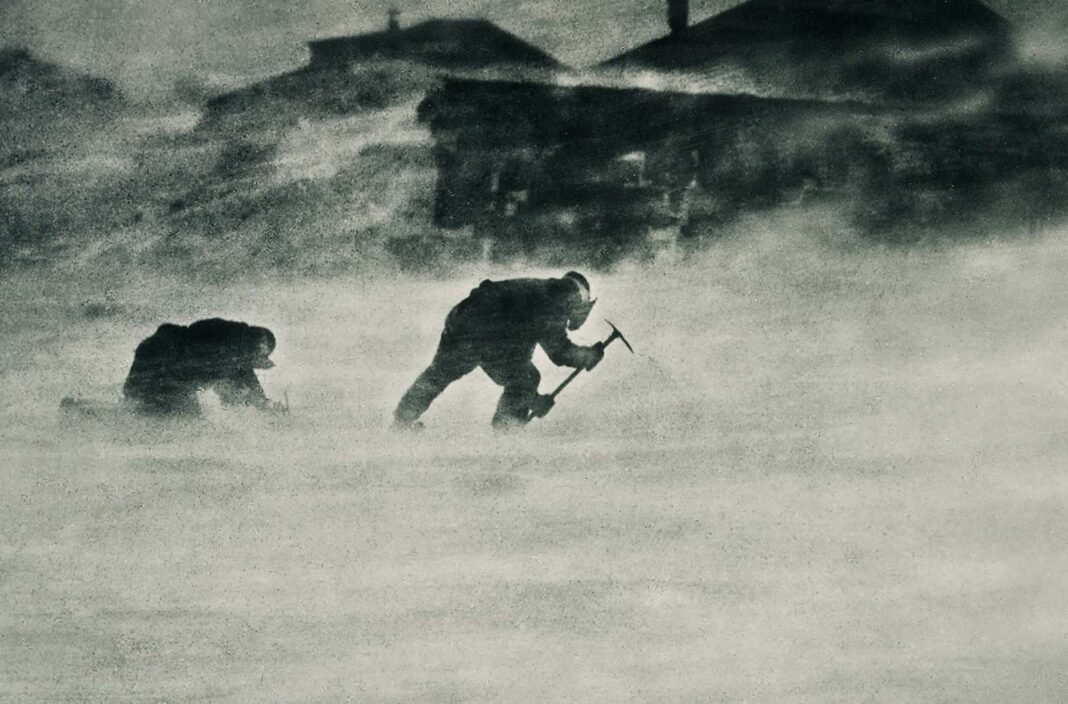In the early 20th century, Antarctica became the ultimate proving ground for human endurance and ambition.
It was a time when explorers risked everything to unlock the mysteries of the frozen continent, venturing into its icy expanse with little more than sheer determination and primitive equipment.
Known as the Heroic Age of Antarctic Exploration, this period earned its name not only for the remarkable feats achieved but also for the lives lost in the unforgiving pursuit of discovery.
This period of exploration began in the late 19th century and came to a close in 1917 with Ernest Shackleton’s Imperial Trans-Antarctic Expedition.
During this period the Antarctic continent became the focus of an international effort that resulted in intensive scientific and geographical exploration and in which 17 major Antarctic expeditions were launched from ten countries.
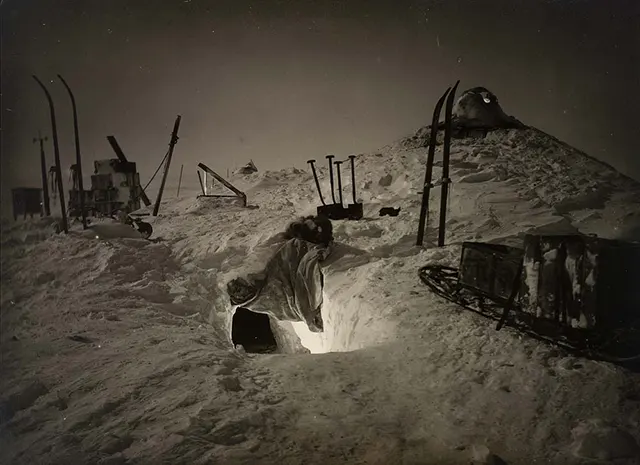
A member of the First Australasian Antarctic Expedition explores an ice cavern near Commonwealth Bay. 1911-1914.
One of the most survival stories emerged from the 1911 Australasian Antarctic Expedition, led by Douglas Mawson.
Sailing south aboard the Aurora, Mawson and his crew braved the Antarctic’s icy seas before setting up camp on the frozen continent.
For over two years, they endured the harshest conditions imaginable, navigating uncharted terrain on grueling sledding expeditions into a land untouched by humanity.

The winter quarters of the Australasian Antarctic Expedition, buried deep beneath the snow. 1911-1914.
On one such journey, Mawson, accompanied by Xavier Mertz and Belgrave Ninnis, embarked on a perilous trek across the ice.
For weeks, the trio pushed forward with their sled dogs until tragedy struck. Ninnis fell into a hidden crevasse, taking vital supplies and six sled dogs with him.
The surviving pair were left with no choice but to turn back, facing nearly 300 miles of treacherous snow and ice with dwindling provisions.
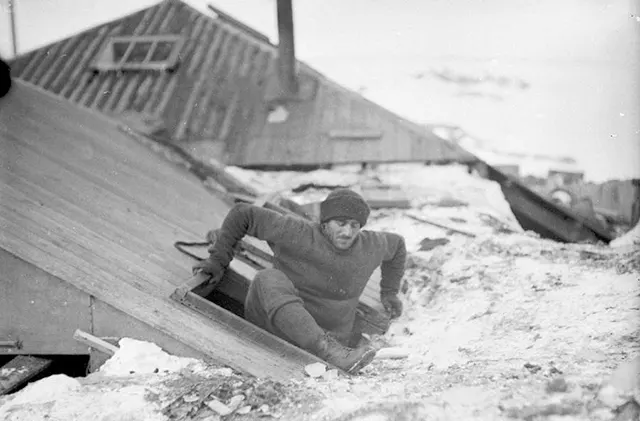
Xavier Mertz climbs out of a trapdoor in the roof of the Australasian Antarctic Expedition’s shelter. The building has been snowed in above the ceiling. 1911-1914.
Desperation forced Mawson and Mertz to survive by eating their sled dogs, but even this grim measure wasn’t enough.
Mertz fell ill and died, leaving Mawson to make the journey alone. Battling hunger, exhaustion, and the brutal cold, he trekked for 30 more days.
When he finally reached the safety of his base, his emaciated and battered appearance stunned his crew, who could barely recognize him.
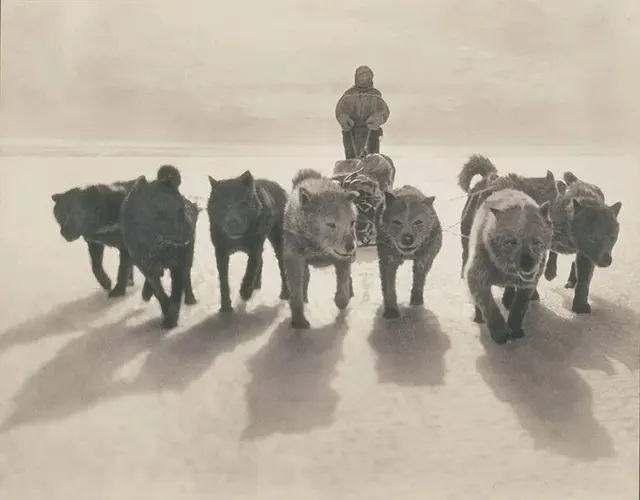
A team of huskies pull a member of the First Australasian Antarctic Expedition. 1911-1914.
Though Mawson survived, the lure of Antarctica continued to draw explorers back, including some of his own men.
Among them was Ernest Shackleton, whose ill-fated Endurance voyage would become another legendary chapter in the Heroic Age.
Trapped in ice and ultimately crushed, the Endurance left its crew stranded in one of the harshest environments on Earth.
For months, Shackleton and his men clung to life on the desolate shores of Elephant Island. Shackleton, determined to save them, led a daring journey across 800 miles of open ocean in a tiny lifeboat to seek help. His resolve and leadership ensured that every member of his crew was eventually rescued.
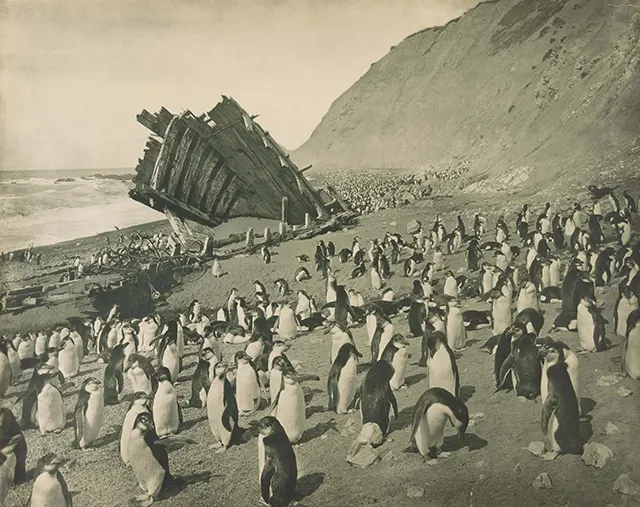
The wreck of the Gratitude, washed up among the penguins of Macquarie Island. 1911. The Gratitude was a schooner that was wrecked on Macquarie Island in Antarctica between 1888 and 1898.
The First German Antarctic Expedition was sent to investigate eastern Antarctica in 1901.
It discovered the coast of Kaiser Wilhelm II Land, and Mount Gauss. The expedition’s ship became trapped in ice, however, which prevented more extensive exploration.
The Swedish Antarctic Expedition, operating at the same time worked in the east coastal area of Graham Land, and was marooned on Snow Hill Island and Paulet Island in the Weddell Sea, after the sinking of its expedition ship. It was rescued by the Argentinian naval vessel Uruguay.
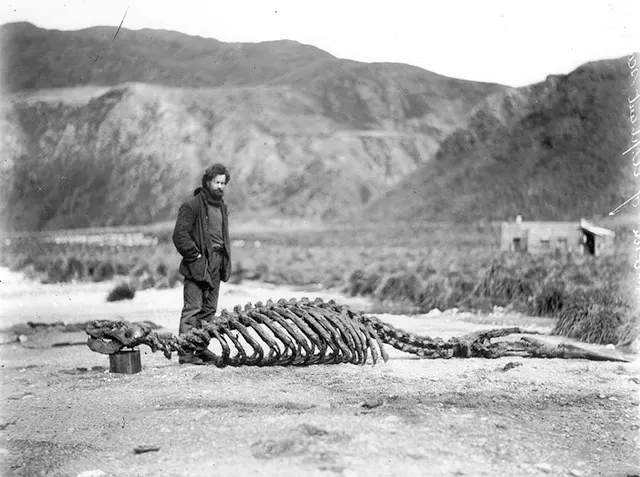
Harold Hamilton, an Antarctic explorer, stands in front of the imposing skeleton of an Elephant Seal. 1911-1914.
The French organized their first expedition in 1903 under the leadership of Jean-Baptiste Charcot.
Originally intended as a relief expedition for the stranded Nordenskiöld party, the main work of this expedition was the mapping and charting of islands and the western coasts of Graham Land, on the Antarctic Peninsula.
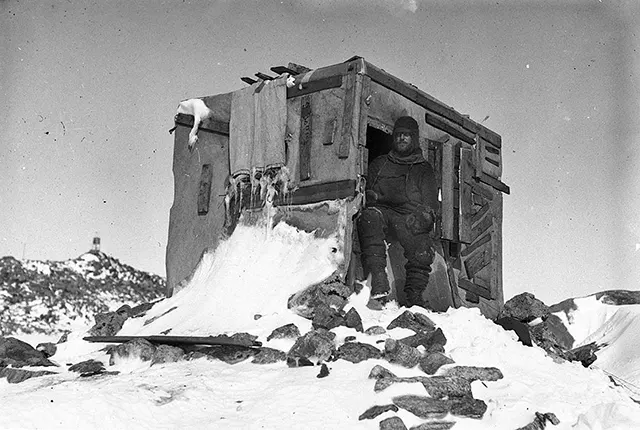
Robert Bage stands at the entrance to the Australasian Antarctic Expedition’s Astronomic Observatory. 1911-1914.
The ultimate prize of the Heroic Age of Antarctic Exploration was reaching the South Pole. In 1910, two expeditions set out to achieve this goal: one led by Norwegian polar explorer Roald Amundsen aboard the Fram and another by Robert Falcon Scott’s British team aboard the Terra Nova.
Amundsen successfully reached the South Pole on December 14, 1911, taking a route from the Bay of Whales to the polar plateau via the Axel Heiberg Glacier.
Scott and his four companions arrived at the South Pole on January 17, 1912, 33 days after Amundsen, having taken the Beardmore Glacier route.
Unfortunately, all five men perished on the return journey, succumbing to starvation and the extreme cold.
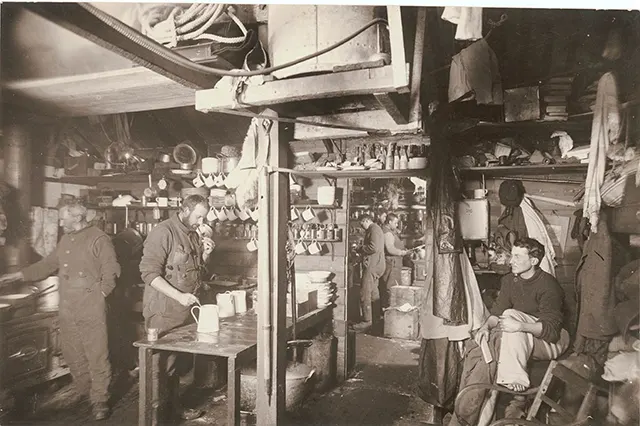
The kitchen in the shelter used by the First Australasian Antarctic Expedition. Circa 1911-1914.
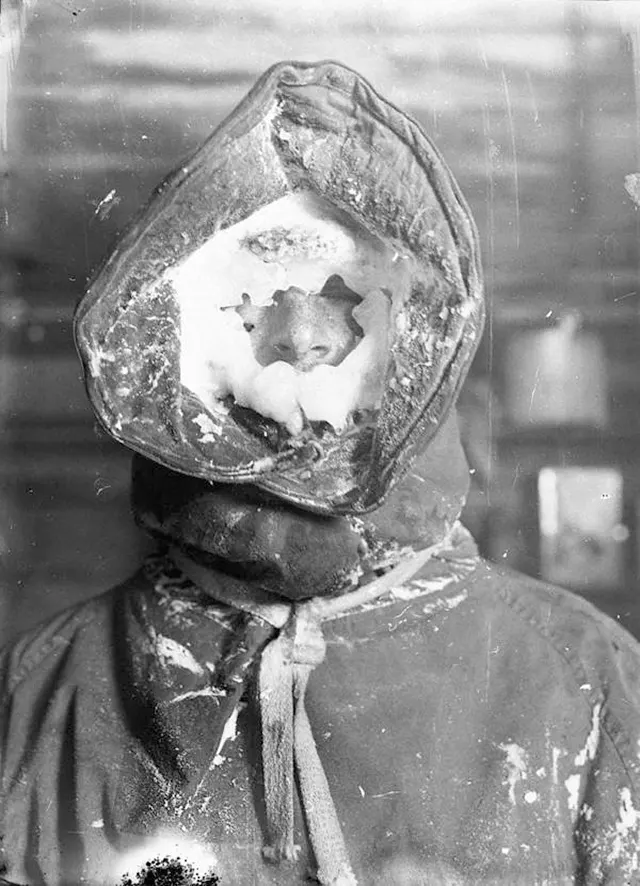
Cecil Madigan of the Australasian Antarctic Expedition, with his face covered in snow. 1911-1914.
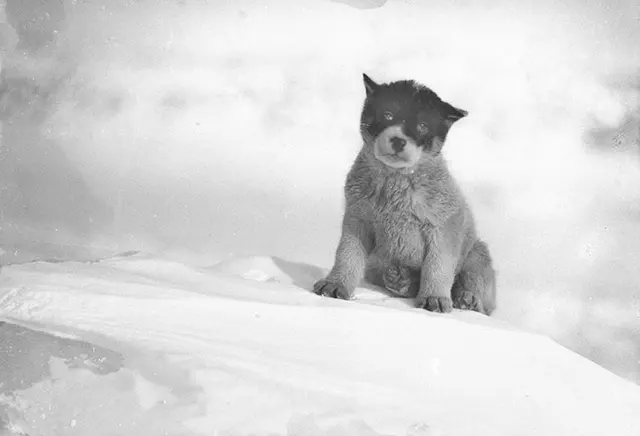
A puppy named Blizzard, part of one of the expeditions to Antarctica. 1911-1914.
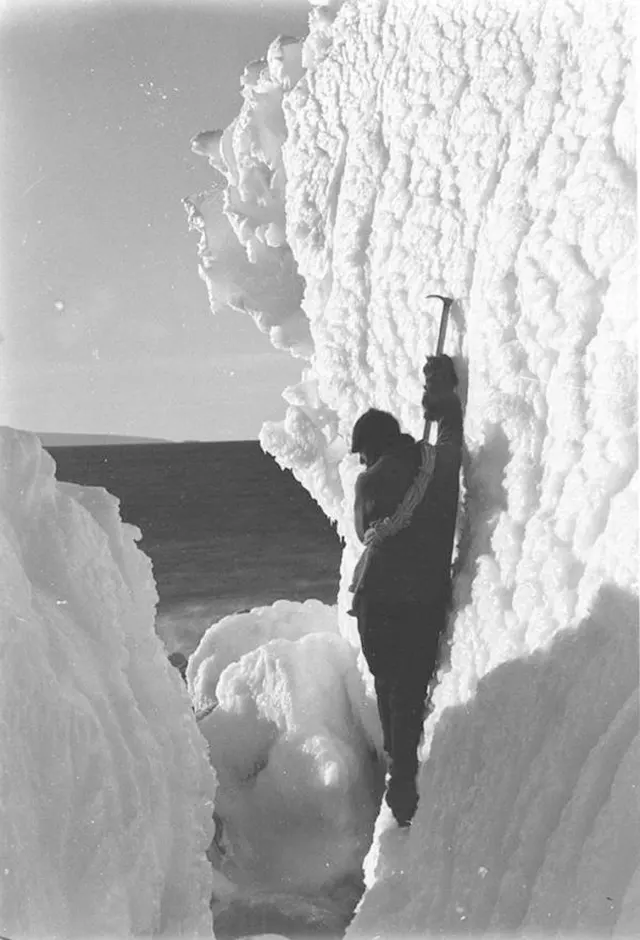
Xavier Mertz climbing an ice ravine. After Ninnis fell through a crevasse, Mertz and Mawson would struggle to make it back to base, being forced to eat their sled dogs on the way. Mertz would not back it alive. 1912.
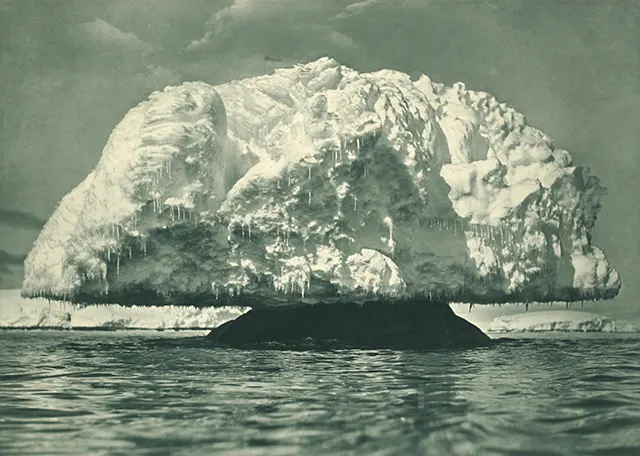
A mushroom ice formation. 1912.
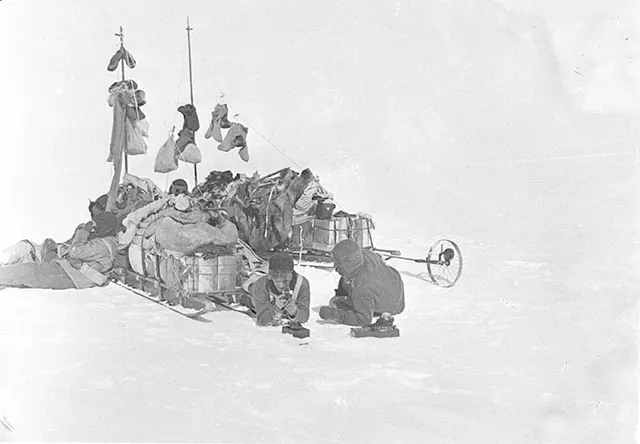
Bob Bage and J. Hunter traveling through unexplored land on their sledges. 1911-1914.
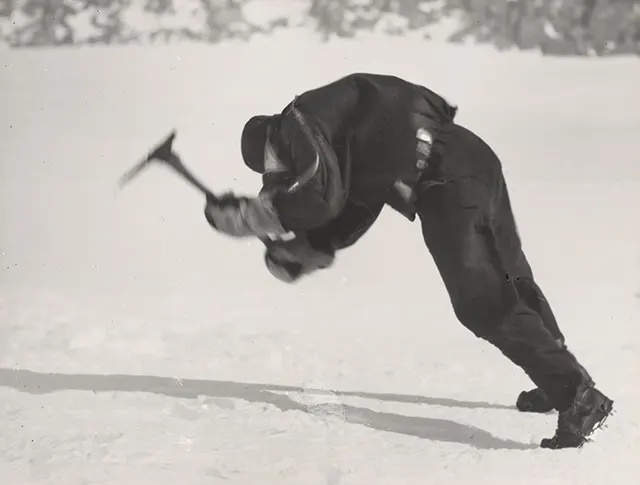
Douglas Mawson, carving out ice, leans against a 100 mph wind. 1911-1914.
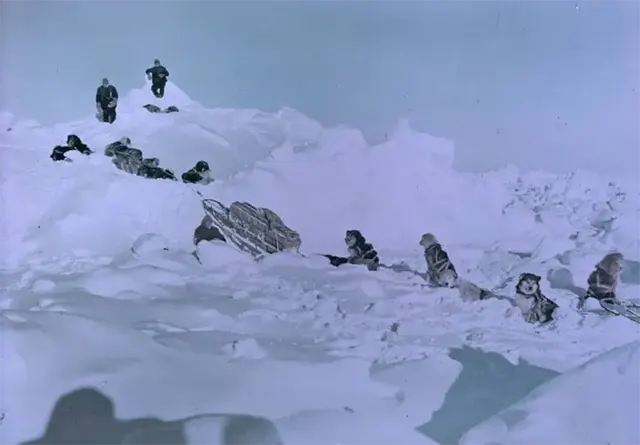
Dog teams scout a way for the explorers to pass through the rough Antarctic land. 1914-1917.
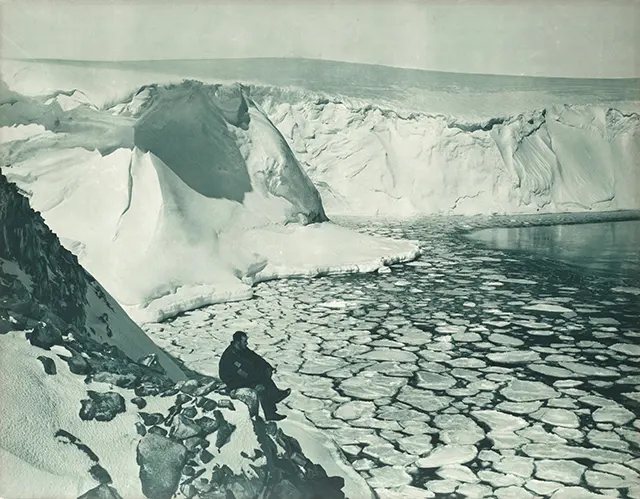
The Australasian Antarctic Expedition’s Frank Bickerton looking out over the sea from Commonwealth Bay. 1911-1914.
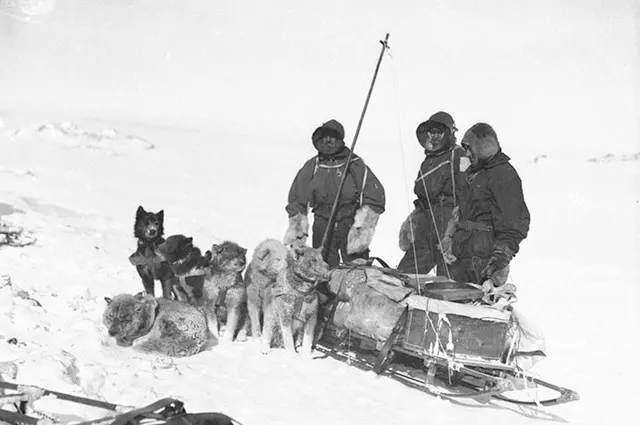
Xavier Mertz, Belgrave Ninnis, and Herbert Murphy head to Aladdin’s Cave. Murphy alone would return from Antarctica alive. 1912.
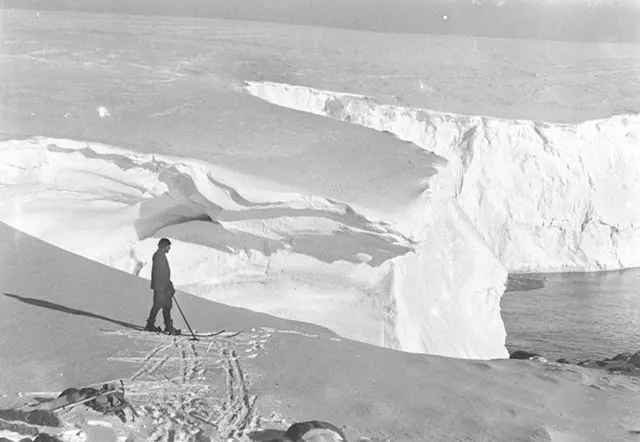
Xavier Mertz outside of the main base. 1912.
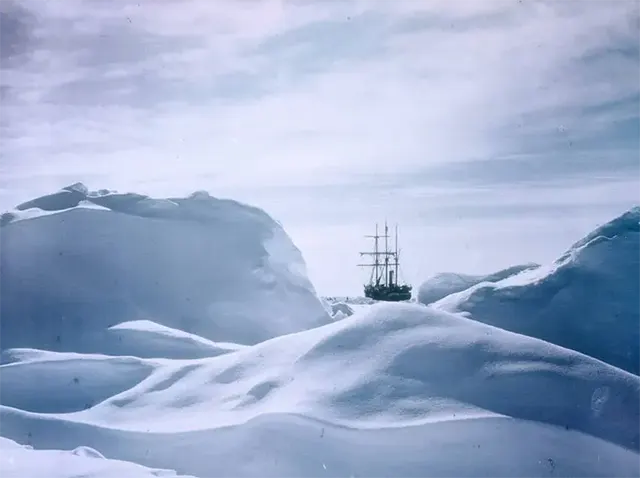
The Endurance seen through a thick bed of snow. 1914-1917.
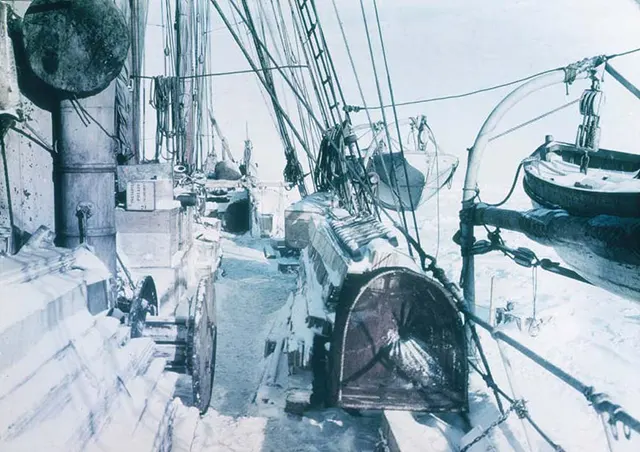
The Endurance, frozen in ice. 1915.
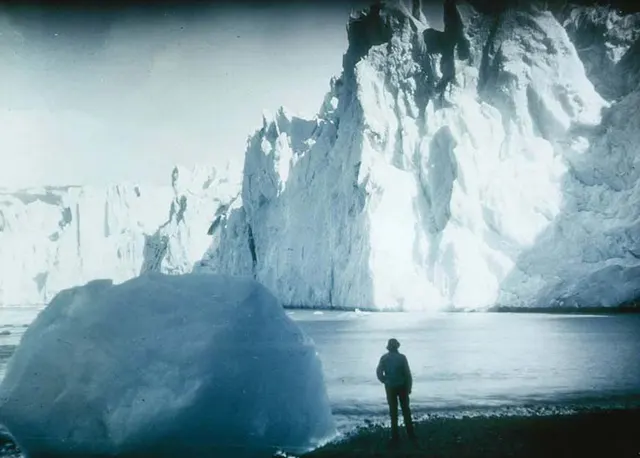
A member of Ernest Shackleton’s Imperial Trans-Antarctic Expedition stares up at a massive glacier. 1914-1917.
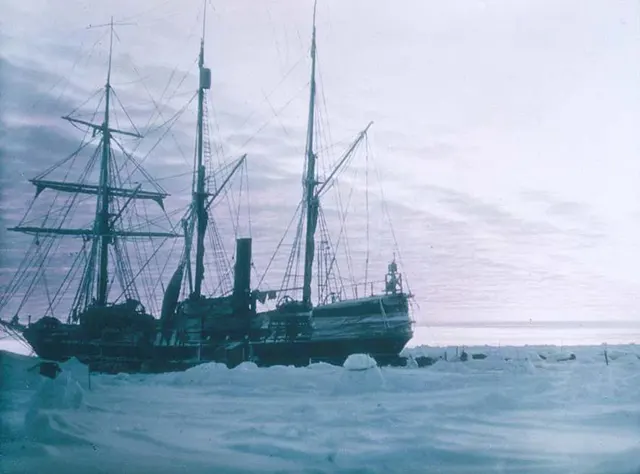
The Endurance, frozen in the ice.
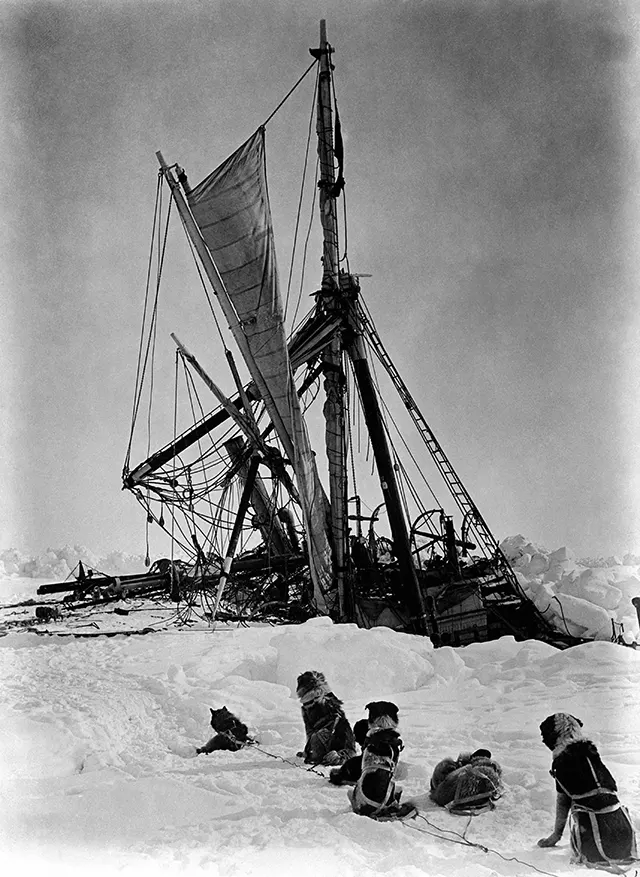
he end of the Endurance. Ernest Shackleton and company were held in ice for nine months before their ship was finally and fully crushed. 1915.
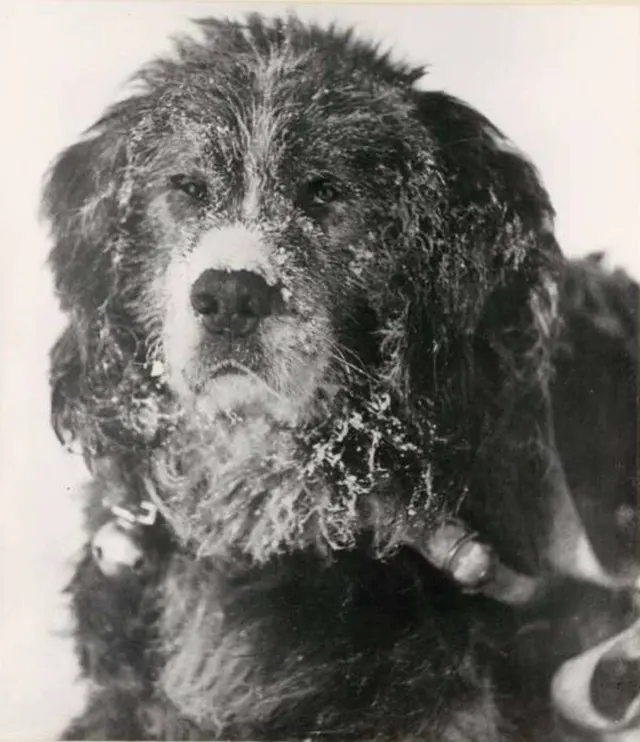
Ernest Shackleton’s dog, Shakespeare, covered in snow and ice. 1914-1915.
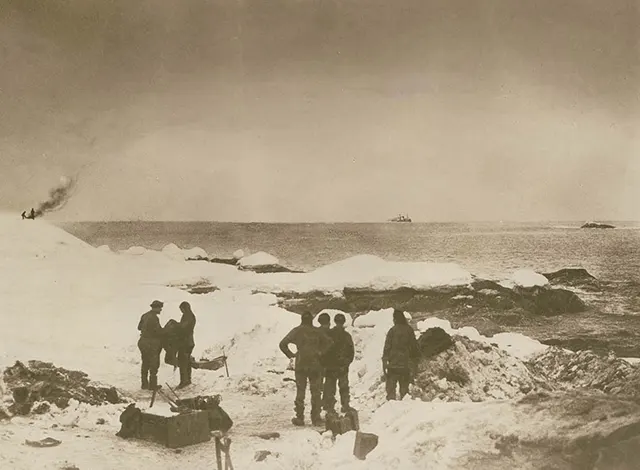
A small ship appears in the distance in order to rescue the men stuck on Elephant Island (Imperial Trans-Antarctic Expedition Rescue). 1916.
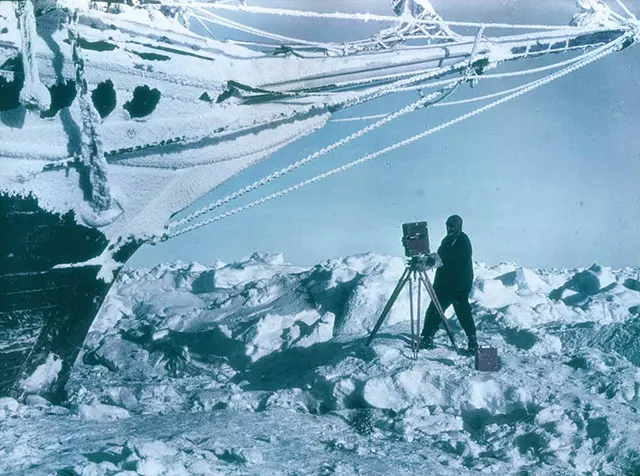
Frank Hurley, the photographer behind all of these images, takes a photo of Ernest Shackleton’s frozen ship, the Endurance. 1914-1917.
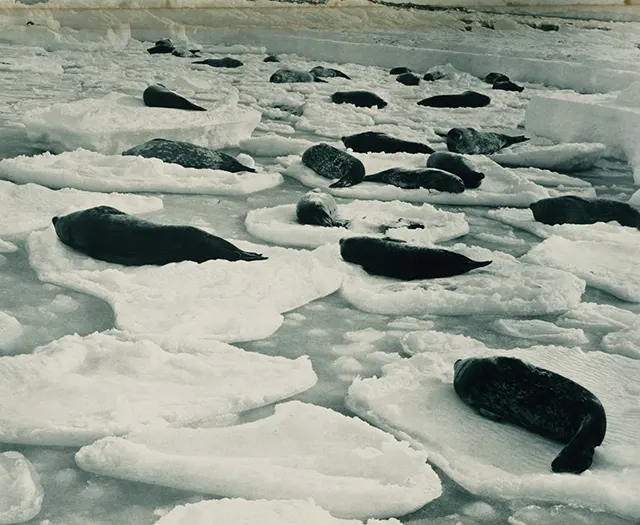
A pack of seals sleep on drifting ice. 1911-1914.
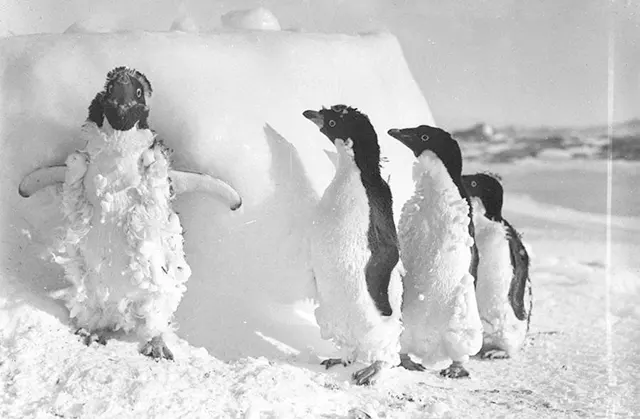
Penguins try to shake off the ice after a harsh blizzard. 1911-1914.
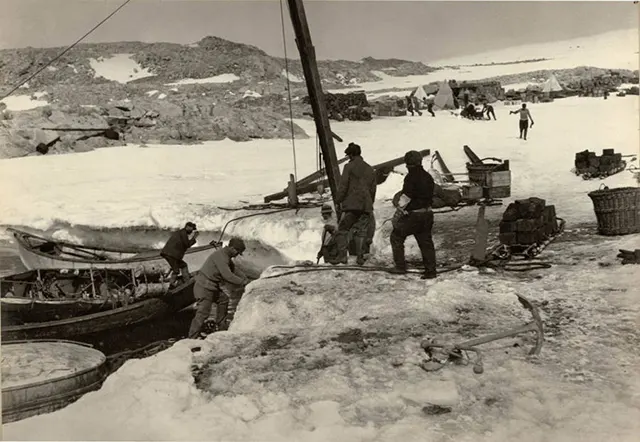
Douglas Mawson and his men unload their supplies at Cape Denison. 1911-1914.
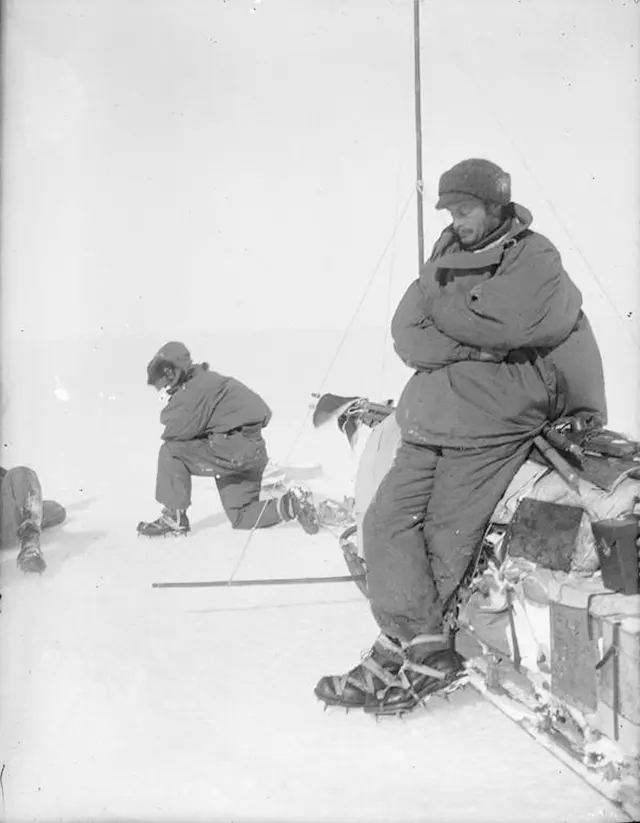
Douglas Mawson rests on the side of his sledge, taking a break during the party’s first journey inland. 1911-1914.
(Photo credit: National Library of Australia / State Library of New South Wales / Wikimedia Commons / Upscaled and edited by RHP).
